Uprising in Turkey - millions protest imprisonment of Erdogan's rival, Ektem Imamoglu
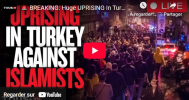 This is a vivid rundown on Tousi Tv https://youtube.com/live/y58J7tMQwhc?si=oUY4ECfa1ecoO-IE.
This is a vivid rundown on Tousi Tv https://youtube.com/live/y58J7tMQwhc?si=oUY4ECfa1ecoO-IE.
 This is a vivid rundown on Tousi Tv https://youtube.com/live/y58J7tMQwhc?si=oUY4ECfa1ecoO-IE.
This is a vivid rundown on Tousi Tv https://youtube.com/live/y58J7tMQwhc?si=oUY4ECfa1ecoO-IE.
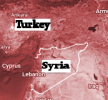 [Update 20 March 2025 - It appears that there has been another uprising in Turkey, What will this mean for Israel and Syria?] The Axis of Genocide: Turkey, run by its two-faced President Erdogan, is part of the axis of genocide.
[Update 20 March 2025 - It appears that there has been another uprising in Turkey, What will this mean for Israel and Syria?] The Axis of Genocide: Turkey, run by its two-faced President Erdogan, is part of the axis of genocide.
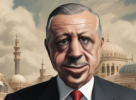 Is Turkey's role in the Middle East, especially regarding its support or provocation of wars and unrest, underestimated? Indeed, it often seems ignored. For instance, during the ongoing genocide against Gaza, much of Israel's oil has come from Azerbaijan, routed through Turkish ports.
Is Turkey's role in the Middle East, especially regarding its support or provocation of wars and unrest, underestimated? Indeed, it often seems ignored. For instance, during the ongoing genocide against Gaza, much of Israel's oil has come from Azerbaijan, routed through Turkish ports.
 We express our sorrow at the fall today of Damascus, Syria, - a secular democracy - to takfiri terrorists backed by Western powers. They are led by Ahmed Hussein al-Shar'a, commonly known as Abu Mohammad al-Julani. The US listed Al-Juliani as a 'Specially Designated Global Terrorist,' in May 2013, and four years later advertised a $10 million reward for information leading to his capture.
We express our sorrow at the fall today of Damascus, Syria, - a secular democracy - to takfiri terrorists backed by Western powers. They are led by Ahmed Hussein al-Shar'a, commonly known as Abu Mohammad al-Julani. The US listed Al-Juliani as a 'Specially Designated Global Terrorist,' in May 2013, and four years later advertised a $10 million reward for information leading to his capture.
Alison Tahmizian Meuse continues with her Twitter/X account @AliTahmizian to report how Armenians are continuing to resist Armenian President Nikol Pashinyan's most recent betrayal of Armenia - his attempt to hand across to Azerbaijan the region of Tavush. (Below is the latest update of 3 May.)
They are marching to save Armenia. https://t.co/aqO4rmPs0O
— Alison Tahmizian Meuse (@AliTahmizian) May 4, 2024
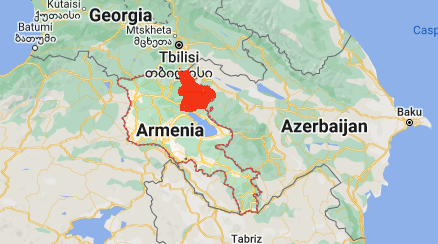 (Updates from 21 April) After years of surrender of territory to the neighbouring Azerbaijan, by President Nikol Pashinyan, Armenians have stood up and opposed Pashinyan's latest betrayal, the attempted handover of Tavush, the region painted red on the map in the north-eastern corner of Armenia. Currently, Ilham Aliyev, President of Azerbaijan is allowing the export of oil to the fascist regime of Benjamin Netanyahu which, has, in the six months since 7 October 2023, murdered over 32,000 Palestinians in the Gaza Strip. The oil is piped from Baku in Azerbaijan, through Georgia to the north of Armenia, thence through Turkey to its port of Ceyhan, from where it is shipped to Israel. This is in spite or Turkish President Erdogan's supposed opposition to Israel's genocide. In recent nationwide local government elections, Erdogan's so-called "Justice and Development" party was wiped out because of the disgust by Turkish voters at Erdogan's duplicity. Hopefully these protest in Armenia will not only lead to the ouster of President Pashinyan, buy also of Azerbaijani President Ilham Aliyev and Turkish President Recep Tayyip Erdoğan. For further information, please follow the Twitter/X account of Alison Tahmizian Meuse at @AliTahmizian or her embedded posts here.
(Updates from 21 April) After years of surrender of territory to the neighbouring Azerbaijan, by President Nikol Pashinyan, Armenians have stood up and opposed Pashinyan's latest betrayal, the attempted handover of Tavush, the region painted red on the map in the north-eastern corner of Armenia. Currently, Ilham Aliyev, President of Azerbaijan is allowing the export of oil to the fascist regime of Benjamin Netanyahu which, has, in the six months since 7 October 2023, murdered over 32,000 Palestinians in the Gaza Strip. The oil is piped from Baku in Azerbaijan, through Georgia to the north of Armenia, thence through Turkey to its port of Ceyhan, from where it is shipped to Israel. This is in spite or Turkish President Erdogan's supposed opposition to Israel's genocide. In recent nationwide local government elections, Erdogan's so-called "Justice and Development" party was wiped out because of the disgust by Turkish voters at Erdogan's duplicity. Hopefully these protest in Armenia will not only lead to the ouster of President Pashinyan, buy also of Azerbaijani President Ilham Aliyev and Turkish President Recep Tayyip Erdoğan. For further information, please follow the Twitter/X account of Alison Tahmizian Meuse at @AliTahmizian or her embedded posts here.
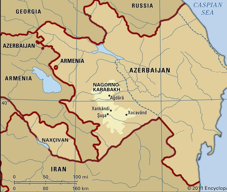
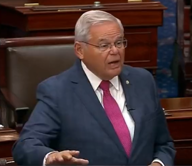 On 12 September, speaking in the US Senate, Democrats Senator Bob Menendez (pictured right) described the efforts by the government of Azerbaijan to prevent food and medical aid from reaching 100,000-120,000 Armenians who have been besieged in the enclave of Artsakh which lies within Azerbaijan (pictured left). He also describes Azerabiajan's atrocieties: the murder of Armenian prisoners of war and the rape of Armenian women.
On 12 September, speaking in the US Senate, Democrats Senator Bob Menendez (pictured right) described the efforts by the government of Azerbaijan to prevent food and medical aid from reaching 100,000-120,000 Armenians who have been besieged in the enclave of Artsakh which lies within Azerbaijan (pictured left). He also describes Azerabiajan's atrocieties: the murder of Armenian prisoners of war and the rape of Armenian women.
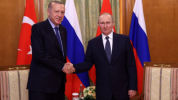 Russian President Vladmir Putin and Turkish President Recep Erdogan held a four-hour meeting on August 5 in Sochi which may change the course of the Middle East, and end the US occupation of Syria.
Russian President Vladmir Putin and Turkish President Recep Erdogan held a four-hour meeting on August 5 in Sochi which may change the course of the Middle East, and end the US occupation of Syria.
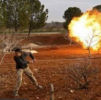 The Syrian Arab Army (SAA) repelled an attack by terrorists on Saraqib on Wednesday and in the early hours of Thursday. Saraqib is a city in northwestern Syria, located east of Idlib. The small city fell to terrorists in 2012 and was liberated by the SAA in 2020. [This story is republished from Mid-East Discourse.]
The Syrian Arab Army (SAA) repelled an attack by terrorists on Saraqib on Wednesday and in the early hours of Thursday. Saraqib is a city in northwestern Syria, located east of Idlib. The small city fell to terrorists in 2012 and was liberated by the SAA in 2020. [This story is republished from Mid-East Discourse.]
The Duran’s Alex Christoforou and Editor-in-Chief Alexander Mercouris discuss the meeting in Moscow between Russian President Putin and Turkey's Erdogan. Erdogan made many outrageous claims, including that Turkey had killed over 2,500 Syrian troops during fighting in Idlib's surrounding areas...a claim which is ridiculous on its face, and exposes how out of touch the Turkish leader is when it comes to this reckless invasion of Syrian sovereignty. See more at The Duran: https://theduran.com
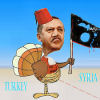 Hot-head President Erdogan seems to be threatening a full-scale invasion of Syria, which would risk major conflict between Russia and the United States. Erdogan is obsessed with the idea of heading up a new Ottoman Empire. These ambitions and Turkey's geographical location make him susceptible to manipulation by restless world powers with a variety of geopolitical interests in the region. We republish this article from https://www.rt.com/news/481179-erdogan-idlib-operation-imminent/ where it first appeared on 19 Feb, 2020 09:14.
Hot-head President Erdogan seems to be threatening a full-scale invasion of Syria, which would risk major conflict between Russia and the United States. Erdogan is obsessed with the idea of heading up a new Ottoman Empire. These ambitions and Turkey's geographical location make him susceptible to manipulation by restless world powers with a variety of geopolitical interests in the region. We republish this article from https://www.rt.com/news/481179-erdogan-idlib-operation-imminent/ where it first appeared on 19 Feb, 2020 09:14.
A new Turkish military incursion into Syria’s Idlib governorate has been planned and may start at any moment, President Recep Erdogan has warned, ramping up a tense standoff with Damascus.
Ankara will not “leave Idlib to the Assad regime and its backers,” Erdogan vowed, referring to the Syrian government and, apparently, to Russia and Iran. Speaking to lawmakers on Wednesday, he said his words were “a final warning.”
The Turkish president also said negotiations with Russia over Idlib have so far failed to meet Ankara’s demands. He said he wanted the province to be safe for Turkey, “no matter the cost.”
The northwestern Syrian province bordering Turkey is the last major stronghold of anti-government forces in the protracted civil war. Ankara backs some of the armed groups in the area, but there is also a strong presence of jihadists, who have no interest in a peaceful resolution of the conflict. Under an agreement with Russia, Turkey is supposed to use its leverage in Idlib to curb violence and prevent attacks on other parts of Syria.
The arrangement never fully worked, with Damascus regularly complaining about cross-border militant attacks. Its response was to gradually take control over some parts of the province, forcing jihadists to retreat. Since last month the advancements put Syrian troops in direct opposition to Turkish forces, which have been deployed in Idlib to monitor the situation. At least two clashes between them have resulted in casualties among the Turks, angering Ankara.
Moscow is mediating in the situation to prevent it from boiling over into a major confrontation. Erdogan has demanded that Damascus pull back its forces from Idlib and threatened to use the Turkish army to force a retreat if necessary.
Western propaganda against Syria has been stepped up, despite recent revelations of how the 'chemical weapons attacks' investigations were rigged by the OPCW, where multiple investigators have come out and blown the whistle. The US-NATO warmongers must be getting quite desperate and have decided that the only way they can keep the ISIS and other terrorist presence in northern Syria is to get Turkey to invade. See "Turkish military op in Idlib only 'matter of time’, Erdogan warns Damascus." We hope this will not come about. Meanwhile, in this video-episode of Going Underground, Afshin Rattansi speaks to Syrian President Bashar Assad's media adviser, Bouthaina Shaaban. She discusses the Syrian Arab Army/pro-government forces victory in Aleppo, which has secured the entire Aleppo region for the first time since 2012, the Idlib offensive and why it has taken so long for the Syrian government to conduct the operation, allegations of Russian and Syrian targeting of civilians in the offensive, her message to President Erdogan in the context of the Turkish occupation of Northern Syria, and more!
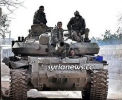 You probably didn't fall for the latest western-corporate press nonsense about Russia and Syria 'brutally attacking Idlib Province in Syria', but you may wonder what is really happening. This is how it appears to us: Turkey and the US want to retain a foothold in Idlib, Northern Syria, along with their terrorist proxies, so that they can sell arms, loot the place, and cause chaos in the region. Turkey is playing Russia and the US for whatever it can get out of them. President Erdogan wants to reestablish the Ottoman Empire in his own name and that is part of his plan for trying to acquire territory in Syria. The US has put some sanctions on Turkey because it purchased weapons from the Russians recently, instead of from the US. Turkey is kind of like a major political prostitute for NATO and anyone else with a mutual short-term aim, including ISIS. The Syrian Arab Army (the Syrian government forces) and the Russians are trying to free the terrorists' human shields in Idlib and restore it to order. Against all odds, the Syrian government has managed to take back nearly all of Syria from the terrorists. (Syrian Arab Army Cleans 16 Towns in 24 Hours from NATO Terrorists in Idlib and Aleppo (8/2/20) by Arabi Souli | SyriaNews) This is probably because it is the only force that has massive support from Syrians. The syndicated western press, which trots out guff about Syria attacking its own people, is a mouthpiece for weapons manufacturers, war, US expansionism and neocolonialism, all major investment stocks. By the way, Iran has opened a criminal case against the US for using terrorists to destabilise the region and for multiple murders and war crimes. Meanwhile the US pretends that it is combatting aggression from Iran. See
You probably didn't fall for the latest western-corporate press nonsense about Russia and Syria 'brutally attacking Idlib Province in Syria', but you may wonder what is really happening. This is how it appears to us: Turkey and the US want to retain a foothold in Idlib, Northern Syria, along with their terrorist proxies, so that they can sell arms, loot the place, and cause chaos in the region. Turkey is playing Russia and the US for whatever it can get out of them. President Erdogan wants to reestablish the Ottoman Empire in his own name and that is part of his plan for trying to acquire territory in Syria. The US has put some sanctions on Turkey because it purchased weapons from the Russians recently, instead of from the US. Turkey is kind of like a major political prostitute for NATO and anyone else with a mutual short-term aim, including ISIS. The Syrian Arab Army (the Syrian government forces) and the Russians are trying to free the terrorists' human shields in Idlib and restore it to order. Against all odds, the Syrian government has managed to take back nearly all of Syria from the terrorists. (Syrian Arab Army Cleans 16 Towns in 24 Hours from NATO Terrorists in Idlib and Aleppo (8/2/20) by Arabi Souli | SyriaNews) This is probably because it is the only force that has massive support from Syrians. The syndicated western press, which trots out guff about Syria attacking its own people, is a mouthpiece for weapons manufacturers, war, US expansionism and neocolonialism, all major investment stocks. By the way, Iran has opened a criminal case against the US for using terrorists to destabilise the region and for multiple murders and war crimes. Meanwhile the US pretends that it is combatting aggression from Iran. See
Iranian lawyers file lawsuit against US over fighters killed in Syria, Sunday, 09 February 2020
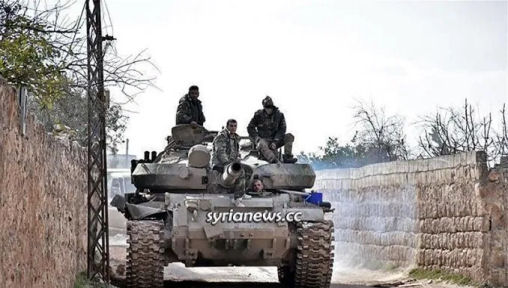
[Article below originally published here: https://www.syrianews.cc/saa-cleans-16-towns-in-24-hours-from-nato-terrorists-in-idlib-and-aleppo/]
The Syrian Arab Army (SAA) responded to the threats of the Turkish pariah Erdogan to withdraw from the Syrian territories and restore al-Qaeda terrorists in the towns and villages recently cleaned from them, by cleaning 16 more towns and villages in the past day alone and continuing.
The Syrian army in a direct challenge to NATO’s Turkish Army and its neo-Ottoman leaders yesterday liberated eight towns in the eastern countryside of Idlib amid a collapse among the ranks of armed terrorists and managed to liberate part of the Aleppo highway, north of Saraqib, which is of great strategic importance because it is a meeting point between the two international roads Aleppo – Damascus, and Aleppo – Latakia.
SAA’s military operations continue on two axes in the north of the country to liberate the rest of the International Damascus-Aleppo M5 Artery, of which more than 85 percent have been liberated. The first axis starts from the southern Aleppo countryside and seeks to reach the strategic Hill of Al-Issa, and the second axis in the eastern countryside of Idlib, specifically from the city of Saraqib.
On the axis of the southern Aleppo countryside, the Syrian army managed to liberate the villages of Khalma, Hamera, Khan Touman, Zethan, and Berna, to arrive at the outskirts of the strategic Hill of Al-Issa, which is considered the point of ‘control by fire’ for the southern Aleppo countryside, and when it manages to liberate al-Ais Hill, its forces will be on the outskirts of the international road Aleppo- Damascus as a prelude to entering the town of Zarba located on this highway.
On the eastern axis of Idlib countryside, the Syrian Army forces deployed in the strategic city of Saraqib after its liberation, the most important city in that area after Maarat al-Numan, which the Syrian Army also liberated.
The SAA’s advance and liberation of large areas in the Idlib countryside has led to a rise in the number of besieged Turkish military posts to five in the rural Idlib and Aleppo.
The SAA’s entry into Saraqib came after the liberation of 17 villages, the most important of which were Al-Mardaikh, Dadikh, and Neirab, stretching to the town of Afis, north of Saraqib.
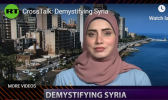 The discussion in this video opens up new topics on the confusing situation with US 'withdrawal' and Turkey incursion in Northern Syria. Particularly interesting is Marwa Osman's framing of why Turkey would want to move Syrian refugees into Northern Syria. She thinks that Erdogan (Turkey's President) has a problem with all the Syrian refugees living in his country because his people resent the presence of this large number of non-Turkish people. If Erdogan can move these refugees into an area he is trying to clear of Kurds in northern Syria, then he can put the Syrian refugees there. Many of those refugees now have Turkish papers. This would have the further benefit for Erdogan's purposes in that, once Erdogan will have moved so many people there, he will more or less control the area with their presence, since he will be organising their settlement and deployment. Video discussion with Ammar Qaqqaf, Marwa Osman, Mike Raddie and Peter Lavelle.
The discussion in this video opens up new topics on the confusing situation with US 'withdrawal' and Turkey incursion in Northern Syria. Particularly interesting is Marwa Osman's framing of why Turkey would want to move Syrian refugees into Northern Syria. She thinks that Erdogan (Turkey's President) has a problem with all the Syrian refugees living in his country because his people resent the presence of this large number of non-Turkish people. If Erdogan can move these refugees into an area he is trying to clear of Kurds in northern Syria, then he can put the Syrian refugees there. Many of those refugees now have Turkish papers. This would have the further benefit for Erdogan's purposes in that, once Erdogan will have moved so many people there, he will more or less control the area with their presence, since he will be organising their settlement and deployment. Video discussion with Ammar Qaqqaf, Marwa Osman, Mike Raddie and Peter Lavelle.
Most Kurds have Syrian citizenship, but some do not. Syrian citizenship is modeled on French law, generally requiring a demonstration of cultural affinity - such as speaking the language. Children born in Syria must demonstrate Syrian paternity; it is not enough to have a Syrian mother. After 1945 there was a diaspora of Kurds from Turkey to Syria. The Syrian government in power during the transitional period between the fall of the UAR and the coming into power of the Baath government, was worried by this inflow from Turkey, which has long had designs on Syrian territory. In 1962 this government held a Syrian census of Kurds in the North requiring proof of residence in Syria from 1945. According to my source on this,[1] there were many illiterate Kurds in the area, without much engagement with the government, so they might not have understood the requirements, if they knew they were being made. 120 stateless Kurds resulted.
During the war in Syria that began in 2011, the United States and other NATO countries cultivated politically ambitious Kurds for their own purposes. Now they have dumped them and many Kurds are fleeing towards the parts of Syria held by the Syrian Government.
Many terrorists remain in the area, including ISIS. It is feared that Turkey will use such fighters to achieve its own ends. Erdogan, who is a member of the Muslim Brotherhood, is thought to want to establish a caliphate along the lines of the old Ottoman Empire.[2] Part of such a caliphate would involve redrawing the 1916 Sykes-Picot agreement borders to bring Northern Syria into Turkey.
Any incursion by Turkey into Syria risks being used by the United States and NATO to their own ends, which are destabilisation and power over oil reserves in the region.
[1]"The Stateless Syrians," Tilburg University, Switzerland, May2013. https://www.refworld.org/pdfid/52a983124.pdf Note that this work was funded by Open Society Foundations, which is a multi-million dollar political engineering program that funds mass migration.
[2] https://foreignpolicy.com/2016/10/23/turkeys-religious-nationalists-want-ottoman-borders-iraq-erdogan/
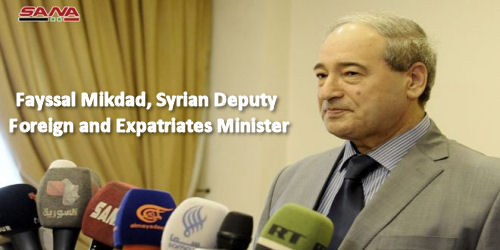
Damascus, SANA-Deputy Foreign and Expatriates Minister, Fayssal Mikdad, described the hostile war launched by the Turkish regime on Syrian territories as “invasion,” saying that attacking a sovereign, independent country is considered as an outrageous act against the UN charter and international law which flagrantly contradicts Security Council relevant resolutions. “The Syrian Arab Army, which confronts the terrorist organizations, will confront the foreign invading forces which are present illegitimately on the Syrian territories and it is ready to face all challenges to which Syria is exposed,” Mikdad said in a press statement at the HQ of Foreign Ministry.
He added that the history will hold Head of the Turkish regime, Erdogan, responsible for being a war criminal who has perpetrated all crimes against the Syrian people.
“A liar and a reality forger has no right to claim that he defends the Syrians or accuse the others of crimes he has perpetrated against the Syrian people," Mikdad said.
Mikdad affirmed that the Syrian army has confronted the Turkish aggression on Syria since the beginning of the terrorist war on the country in a lot of sites and it fought the terrorists who were supported and armed by the Turkish regime.
He held the Turkish regime responsible for displacing the Syrians from their lands as it has perpetrated crimes against them through its terrorists and mercenaries, but, the Syrian state has been and still is committed to all its citizens and their return, without preconditions, to villages and towns in Syrian al-Jazeera.
On whether there are any contacts in order to pave the way for the entry of the Syrian army to Syrian al-Jazeera regions or not, Mikdad stressed that the Syrian government has made discussions with all its citizens and expressed, as from the beginning, readiness to make necessary reconciliations, but, the armed powers in that region rejected all attempts and insisted to pave the way, directly or indirectly, for the Turkish occupiers to invade north of Syria.
“The Turkish aggression on the Syrian territories makes Turkey in a position that doesn’t differ from Daesh terrorist organization and many other terrorist groups,” Mikdad said.
He affirmed that the Turkish aggression on Syrian territories will have political repercussions and impacts on the political process in Syria, saying that the international community and the UN should halt this aggression, deter it and make pressures on the Turkish regime to withdraw its army in order to run the political process and the work of the constitutional committee, unless, it will face a lot of obstacles while Turkey threatens to occupy Syrian territories.
Mikdad concluded by affirming that Syria, with its heroic army, will defend each Syrian citizen wherever he was in the framework of its legitimate right according to international law and UN conventions.
Source of article: Mikdad: Turkish aggression is an invasion of Syrian territories… Syrian Army ready to confront all challenges,"10 October، 2019.
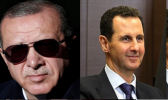 The Syrian Kurds have asked Syria to help them because Turkey is threatening them. President Erdogan treats them as an extension of the Kurds in Turkey who want independence from Turkey. During the main part of the war in Syria (which seems to be tailing off now) the Kurds fought the Takfiri rebels. The United States, which supplied a lot of the so-called rebels including ISIS (indirectly at least) at times appeared to support Kurdish independence, using them as a lever against the Syrian Government. The Kurds had been offered control of their own department by the Syrian Government, but not actual independent state status. The US rewarded a Kurdish independence movement against Syria, although it is not clear that all Kurds in Syria really wanted this. The region also contains substantial minorities of Arabs and others whom a separate Kurdish state might not have suited. Until Russia intervened in the war (at the invitation of the Syrian Government) it looked like the United States backed terrorists were going to tear the country apart. The UN and NATO and its allies, including Australia, all supported this with a policy of removing President Assad and splitting Syria into many little states. The western public and corporate media provided propaganda to support this. Western readers were given no critical comparison with the prior destruction of Afghanistan, Iraq and Libya, states destroyed by the same kind of tactics. YouTube gave great comfort to these lies when it suddenly removed all of the Syrian Presidency's interviews, claiming some breach of advertising. [Suddenly some of them are back, as the wind is changing.] Since the insurgency began in 2011, Turkey provided a covert base for terrorists to attack Syria from. After Russia intervened with the invitation of Syria, the US, which was an illegal and unwelcome presence in Syria, tried to get Turkey to support it. As it was also promoting the idea of the Kurds having an independent state, Turkey's support could never be relied on. Turkey could always align itself with the Russians, although, in the end, it seemed to prefer to be independent and it has its own ambitions to dominate the region. By outing the murder of the journalist, Kashoggi, in the Saudi Embassy in Turkey, Turkey has made itself look a bit respectable, but it is not inconceivable that Erdogan is supporting the ruling elite in Saudi Arabia against the Crown Prince, for strategic purposes. No-one really knows. Whilst Turkey is not a Wahabist state, Erdogan is a leader in the Muslim Brotherhood, which wants to establish a new Muslim caliphate in the Middle East and much of Europe. Syria is a multi-religion state which includes many Christians and it does not support a Muslim caliphate. This editorial is by Sheila Newman and James Sinnamon, candobetter editors. We have republished the following report on the state of the war in Syria from RT.
The Syrian Kurds have asked Syria to help them because Turkey is threatening them. President Erdogan treats them as an extension of the Kurds in Turkey who want independence from Turkey. During the main part of the war in Syria (which seems to be tailing off now) the Kurds fought the Takfiri rebels. The United States, which supplied a lot of the so-called rebels including ISIS (indirectly at least) at times appeared to support Kurdish independence, using them as a lever against the Syrian Government. The Kurds had been offered control of their own department by the Syrian Government, but not actual independent state status. The US rewarded a Kurdish independence movement against Syria, although it is not clear that all Kurds in Syria really wanted this. The region also contains substantial minorities of Arabs and others whom a separate Kurdish state might not have suited. Until Russia intervened in the war (at the invitation of the Syrian Government) it looked like the United States backed terrorists were going to tear the country apart. The UN and NATO and its allies, including Australia, all supported this with a policy of removing President Assad and splitting Syria into many little states. The western public and corporate media provided propaganda to support this. Western readers were given no critical comparison with the prior destruction of Afghanistan, Iraq and Libya, states destroyed by the same kind of tactics. YouTube gave great comfort to these lies when it suddenly removed all of the Syrian Presidency's interviews, claiming some breach of advertising. [Suddenly some of them are back, as the wind is changing.] Since the insurgency began in 2011, Turkey provided a covert base for terrorists to attack Syria from. After Russia intervened with the invitation of Syria, the US, which was an illegal and unwelcome presence in Syria, tried to get Turkey to support it. As it was also promoting the idea of the Kurds having an independent state, Turkey's support could never be relied on. Turkey could always align itself with the Russians, although, in the end, it seemed to prefer to be independent and it has its own ambitions to dominate the region. By outing the murder of the journalist, Kashoggi, in the Saudi Embassy in Turkey, Turkey has made itself look a bit respectable, but it is not inconceivable that Erdogan is supporting the ruling elite in Saudi Arabia against the Crown Prince, for strategic purposes. No-one really knows. Whilst Turkey is not a Wahabist state, Erdogan is a leader in the Muslim Brotherhood, which wants to establish a new Muslim caliphate in the Middle East and much of Europe. Syria is a multi-religion state which includes many Christians and it does not support a Muslim caliphate. This editorial is by Sheila Newman and James Sinnamon, candobetter editors. We have republished the following report on the state of the war in Syria from RT.
Republishing from RT at https://www.rt.com/news/447572-syrian-forces-enter-manbij/.
Damascus says it has deployed troops to the city of Manbij, the focal point of a tense standoff between Kurds and Turkey, as the government continues attempts to reassert control over the strategic border area in Syria’s north.
The Kurdish YPG militia on Friday called on Damascus to secure Manbij, located close to the border with Turkey. Ankara earlier said it plans to conduct an “anti-terrorist operation” around the city, with the YPG being the target.
In response, Damascus said its troops were already in the north and raised the flag in the “area of Manbij.” In a statement from the general staff broadcast by the Syrian media, the top brass said their army was determined to “crush terrorism and defeat all invaders and occupiers” as well as to provide security for all Syrian citizens.
Also on rt.com
Kurdish YPG calls on Syrian government to protect Manbij from Turkish attack
Just how far-reaching the Syrian deployment is and if it’s taking place at all is yet to be confirmed by other sources, as is the Syrian Army troops’ arrival in the city proper.
Skeptical over the statement from Damascus, Turkey’s President Recep Tayyip Erdogan called the “flag-raising” a “psychological action.” He, however, acknowledged that there would be no need for the Turkish Army op in Manbij if the Kurds pull out of the city.
Meanwhile, Turkey-backed militants opposed to both the government and the Kurds said they were moving fighters towards Manbij and were prepared to start an operation there, if necessary.
Damascus is trying to assert full control over Syrian territory, a goal that remains elusive despite significant progress over the year. Among the contested zones are the province of Idlib, some Kurdish-controlled areas and a region on the border with Jordan, where a US military outpost is located.
The Kurds and the central government have remained mostly neutral towards each other over the years of the conflict and occasionally allied against jihadist groups. The Manbij maneuver does not make them immediate allies, but with Kurds de facto asking protection from the Syrian government, Damascus now seems in a stronger position to negotiate the degree of autonomy the Kurds would have after the political transition in the country. They currently control large swaths of territory east of Euphrates River, which is rich in oil, and crude revenues would be crucial for Syria’s post-war reconstruction.
Also on rt.com
Arab states are making nice with Assad’s Syria. Will the West follow suit?
Manbij became the focus of tense war of words earlier this month, after Erdogan said he was prepared to order a new “anti-terrorist operation” targeting the Kurds. He said the move was necessary because the US failed to make the YPG remove their fighters from the area, despite promises to do so.
The US, a key ally of the Kurds for the past several years, has meanwhile decided to withdraw its troops from Kurd-controlled areas in Syria, including Manbij. The withdrawal promises to be a game-changer for Kurds, who relied on American backing for protection against Turkey, but it is also yet to happen.
Ankara has amassed a fighting force near its southern border over the past few weeks but stopped short of launching the promised offensive. Turkey sees all Kurdish militias as an extension of its domestic Kurdish insurgency and attacked them repeatedly in both Syria and Iraq.
The situation is to be discussed on Saturday by top Turkish and Russian officials at a meeting in Moscow. Russia, a backer of Damascus in its fight against jihadist groups, said the deployment in Manbij may be a good sign that stabilization of Syria is progressing. But a spokesman for the Kremlin indicated that the outcome would depend on how the talks in Moscow unfold.
 U.S. imperialism’s deteriorating position in the Middle East was confirmed on Jan. 17, by Secretary of State Rex Tillerson’s bold assertion for U.S. plans in Syria. The arrogant statement was followed, within hours, by almost immediate backpedaling.
U.S. imperialism’s deteriorating position in the Middle East was confirmed on Jan. 17, by Secretary of State Rex Tillerson’s bold assertion for U.S. plans in Syria. The arrogant statement was followed, within hours, by almost immediate backpedaling.
Tillerson’s talk at the Hoover Institution at Stanford University confirmed that the only hope of maintaining U.S. domination is another desperate attempt to close all borders and dismember the entire region. But the latest plan has also created a rupture in NATO, the oldest and largest U.S.-commanded military alliance. [Article first published on Global Research at https://www.globalresearch.ca/war-in-syria-the-us-a-wounded-predator-spreads-chaos-in-middle-east/5627212]
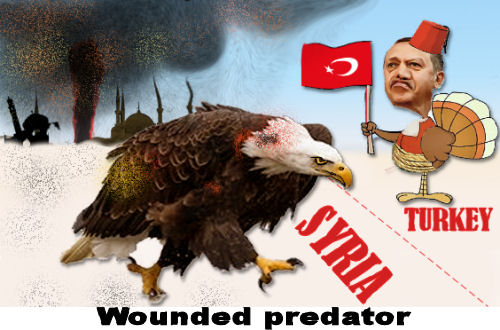
Meanwhile, Turkish planes bombed 100 positions in Syria of U.S.-backed Kurdish YPG forces (the Kurdish acronym for People’s Protection Units) on Jan. 21.
As the war in Syria stretches into the seventh year, Tillerson grandly announced the U.S. military will remain in Syria indefinitely. The newest U.S. plan is to create and train a military border force of 30,000 soldiers. The Secretary of State also arrogantly restated the U.S. demand that has met with failure for seven years: the ouster of Syrian President Bashar al-Assad and the overthrow of the Syrian Arab Republic government.
This was not the first mention of new U.S. plans there. General Joseph Votel, commander of U.S. Central Command, said on Dec. 24 that a training program was being established for Kurdish and Arab fighters to become a permanent U.S. occupying force in Syria. Votel declared, “What we don’t want to do is leave a mess.” (us.pressfrom.com, Dec. 24)
In fact, U.S. long-term plans are to permanently divide Syria and Iraq and expand their imperialist “mess” into Iran.
Since Jan. 14, news reports around the world reported U.S. plans to create a new “border force” in Syria on the borders of Turkey and Iraq. This U.S. plan would separate the oil-rich northern region from the rest of Syria, create a mini-state and close the borders.
Washington said it would help Syrian Democratic Forces, an alliance of militias in northern and eastern Syria led by Kurdish YPG militias, to set up a new 30,000-strong border force.
A flurry of other U.S. statements drew out this plan more explicitly.
The coalition’s Public Affairs Office said: “The base of the new force is essentially a realignment of approximately 15,000 members of the SDF to a new mission in the Border Security Force as their actions against ISIS [the Islamic State group, IS] draw to a close.” (Reuters, Jan. 14)
Before the announcement of a new U.S. plan to occupy and divide the region, numerous commentators described an unprecedented development with the defeat of IS – open borders among Iran, Iraq, Syria, Lebanon and Turkey. The whole region has been divided since the 1991 U.S. war to recolonize and divide Iraq.
Turkey immediately slammed this new plan of a permanent U.S. occupation through an alliance with YPG Kurdish forces in Syria. Turkey warned of military action against the U.S.-armed and -protected YPG forces.
In the face of Turkey’s fierce opposition, Tillerson claimed, “That entire situation has been misportrayed, misdescribed, some people misspoke. We are not creating a border security force at all.” (aljazeera, Jan. 18)
Turkey’s great fear is that a “border force” of U.S.-armed Kurdish militias will siphon off advanced U.S.-supplied weapons, including anti-aircraft missiles, to Kurdistan Workers' Party (PKK) forces in Turkey.
Although there are 1.5 to 2 million Kurds in Syria, there are almost 20 million nationally oppressed Kurds in Turkey. Making up 20 percent of population, they are the majority population in southern Turkey, bordering northern Syria, Iraq and Iran.
For decades the Pentagon has armed Turkey and aided in the brutal repression of the Kurds, who resisted under the leadership of the PKK.
But imperialism sees an opportunity to use the smaller Kurdish population in Syria, where they are 5 percent to 8 percent of the Syrian population, as a way to divide Syria. The Kurds in Syria are under the leadership of the Democratic Union Party (PYD); their armed units are the YPG. These are the main units of the U.S.-armed Syrian Democratic Forces.
U.S. imperialism used a similar scenario to impose a division on Iraq. This is imperialism’s divide-and-rule strategy for the entire region. Using the Kurds’ national aspirations for a temporary U.S. military or political advantage, and then cynically dropping them, dates back to Henry Kissinger.
The Kurds are a historically oppressed nation with a distinct language and culture, numbering over 30 million people. They are the largest nation without a state. They live in the underdeveloped, mountainous region spanning four countries: southern Turkey and northern Iraq, Iran and Syria.
Some 72 Turkish jets bombed U.S.-backed Kurdish militias in Syria on Jan. 21. The Turkish news agency Anadolu reported that jets bombed more than 100 targets, including an air base, in the first day of air operations against YPG militias. The operation targeted YPG barracks, shelters, positions, weapons, vehicles and equipment.
Each U.S. maneuver has created greater destruction, but the U.S. has been unable to consolidate its position in the region or gain stable allies.
Since 2011 the U.S. has covertly armed a whole series of conflicting militias and mercenaries.
With a wink and a nod from U.S. forces in the region, which were arming numerous extremist militias, Saudi Arabia and Turkey armed the fanatical IS army. This became an excuse for open U.S. bombing of Syrian infrastructure.
The U.S. military command pulled 19 other NATO and Gulf countries into the war in Syria. This military onslaught was totally uninvited by the Syrian government.
The Syrian government appealed to Iran, Russia and Hezbollah forces in Lebanon to aid them in defeating IS and the Pentagon-funded militias and mercenaries. This forced Washington to change tactics, but not its objective -- the recolonization of the region.
U.S.-imposed sanctions against Iraq and then Syria were an effort to destroy all forms of normal economic exchange and to shut down all commercial and social life. The U.S. occupation of Iraq divided the country into walled-off mini-states with checkpoints and inspections. All borders were closed. U.S. intervention in Syria was designed to do the same thing.
U.S. wars in the region have displaced more than 10 million people and decimated the region. They have created animosity and suspicion on every side, divided the corrupt and a brutal feudal Gulf state regime aligned with imperialism, and are now dividing the oldest U.S. military alliance -- NATO.
But after seven years of war and 15 years of sanctions, U.S. imperialism has still not succeeded in destroying the sovereign government of the Syrian Arab Republic.
About Sara Flounders: Sara Flounders is an American political writer who has been active in anti-war organizing since the 1960s. Flounders sits on the board of directors for the International Anti-imperialist Coordinating Committee, is founder and an organizer with United National Antiwar Coalition, and is Secretary of the National Board of the National Coalition to Protect Civil Freedoms.
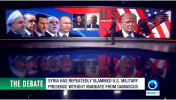 Although the US presence in Syria is illegal, the US is talking about putting more troops there, presumably to fire up a war that the Russians and the Syrians have almost succeeded in extinguishing. Erdoğan has accused the US of planning to form 'terror army' in Syria: 'Our mission is to strangle it before it’s even born’, said the Turkish president of 30,000-strong force aimed at dividing and conquering Syria by promoting a Kurdish separist movement. In this edition of The Debate, Press TV has conducted an interview with Hafsa Kara-Mustapha, a journalist and political commentator from London, and Wafik Moustafa, the chairman of Conservative Arab Network, from London, to discuss the United States' plans to station 30,000 militants on the Syrian borders with Turkey and Iraq. This videoed debate was first published on Iranian Press tv on Tue Jan 16, 2018 at http://www.presstv.com/Detail/2018/01/16/549062/Washingtons-deployment-plan-in-Syria
Although the US presence in Syria is illegal, the US is talking about putting more troops there, presumably to fire up a war that the Russians and the Syrians have almost succeeded in extinguishing. Erdoğan has accused the US of planning to form 'terror army' in Syria: 'Our mission is to strangle it before it’s even born’, said the Turkish president of 30,000-strong force aimed at dividing and conquering Syria by promoting a Kurdish separist movement. In this edition of The Debate, Press TV has conducted an interview with Hafsa Kara-Mustapha, a journalist and political commentator from London, and Wafik Moustafa, the chairman of Conservative Arab Network, from London, to discuss the United States' plans to station 30,000 militants on the Syrian borders with Turkey and Iraq. This videoed debate was first published on Iranian Press tv on Tue Jan 16, 2018 at http://www.presstv.com/Detail/2018/01/16/549062/Washingtons-deployment-plan-in-Syria
If the embedding function below does not show, click here to watch the program on press tv directly.
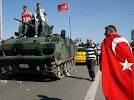 Well, Erdogan is still in situ. No-one is sure whether this was a real attempted coup or a false flag. Erdogan is already infamous for imprisoning journalists who do not toe his line and now it is feared that Erdogan is now going to use this incident to ramp up his power in new terrorism laws which will be used to further repress the Turkish people. There are also fears that attempts to bring in a new non-secular constitution might gain somehow from the shoring up of Erdogan's power post-coup attempt. Erdogan is known as a covert supporter of the extreme aims of the Muslim Brotherhood. Inside we have republished a statement from the Turkish Communist Party, which insists that neither the government nor the parties to the coup were operating for the good of Turkey. Indeed, most citizens of Turkey, looking at their neighbours - Syria, Libya, Irak, Afghanistan - would probably prefer any kind of stability to violent change of government. And, by the way, the United States has a nuclear-armed airbase in Turkey.
Well, Erdogan is still in situ. No-one is sure whether this was a real attempted coup or a false flag. Erdogan is already infamous for imprisoning journalists who do not toe his line and now it is feared that Erdogan is now going to use this incident to ramp up his power in new terrorism laws which will be used to further repress the Turkish people. There are also fears that attempts to bring in a new non-secular constitution might gain somehow from the shoring up of Erdogan's power post-coup attempt. Erdogan is known as a covert supporter of the extreme aims of the Muslim Brotherhood. Inside we have republished a statement from the Turkish Communist Party, which insists that neither the government nor the parties to the coup were operating for the good of Turkey. Indeed, most citizens of Turkey, looking at their neighbours - Syria, Libya, Irak, Afghanistan - would probably prefer any kind of stability to violent change of government. And, by the way, the United States has a nuclear-armed airbase in Turkey.
We do not have all the details of what happened during the coup attempt that took place in Turkey in the hours between July 15 and July 16. However, we know very well that plans that are supported by foreign forces, that do not take its power from the working class cannot defeat AKP [Edrogan's Party] [1] darkness and solve Turkey's problems. The events of today reminded us the following reality once again: Either the people of Turkey will organize and get rid of AKP or AKP's reactionary policies will intensify, repression will increase, massacres, the plunder and theft will continue.
The only power that can overthrow AKP is the people's power, there is no alternative to it.
AKP is responsible for all that took place tonight. All the factors that led to the current situation and the conditions are the product of AKP's rule and the domestic and foreign bosses that support AKP.
However, the fact that the main responsible party is AKP does not mean that the coup attempt was one that was orchestrated by Erdogan himself in order to achieve his objectives such as paving the path to an executive presidency or clearing the obstacles facing the new constitution.
The tension and the rivalries between different groups within the state and the armed forces that have been known to exist for a while have turned into armed conflict. While the tension between these forces is real, it is a lie that any of the sides in this conflict represent the interests of the people. Following this, searching for the solution against AKP's rule in a military coup is as wrong as lending any support to AKP under the guise of taking a position against military coups for whatever reason. The last thing that should be done in the name of supporting freedom and human rights in Turkey is to lend support to AKP which has proven over and over that it is an enemy of humanity.
While they have not orchestrated this coup, Erdoğan and the AKP will make an effort to use the resulting conditions and the support they received as means to increase their legitimacy. Our people should be on the alert against steps that AKP will be certain to take in the days to come. Raising the struggle against AKP and its darkness is the only way to stop this failed coup attempt resulting in AKP's solidifying its rule and turning into a tool for transforming AKP's unstable Turkey into stability. The fact that all mosques in Turkey have broadcasted continuous Erdoğan propaganda the whole night is a concrete indication of the urgency of our task at hand.
The Communist Party is calling on our people to organize in the Party's ranks to wage the struggle against the people and humanity.
The liberation is in our own hands.
Communist Party, Turkey
[1] AKP: The Justice and Development Party (Turkish: Adalet ve Kalkınma Partisi), abbreviated JDP or AKP in English and AKP or AK Parti in Turkish, is a social conservative political party in Turkey. This is President Erdogan's party.
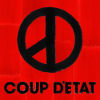 07.58am from a source in Turkey: "We heard the news about two hours ago. I am just outside the city centre in Ankara. First
07.58am from a source in Turkey: "We heard the news about two hours ago. I am just outside the city centre in Ankara. First
the airforce and then the jandarma and when we heard the Army had joined, it was clear it was all over. Erdogan is reported to be out of the country or on his way back Ankara.
AKP has called on supporters to take to the streets.
I think it is all over for the AKP.
Chief of staff arrested.
A very big explosion at Army HQ.
Army taking over police HQ - police are iwth the AKP.
Shooting in the diplomatic/parliamentary district of Ankara.
Helicopters overhead ... martial law imposed.
I think it is all over for Erdogan.
I don't think AKP can resist. No-one is on the street... AKP call not being answered... My guess is that the Turkish people will defer to power and authority and Erdogan has lost it.
Mayor of Ankara also calling for people to come to the streets but he is AKP and up to his neck in dirt.
No, it is clear the coup has worked and was well-planned."
8.20 am from Ex- Aleppo resident: "I just heard from relatives in Aleppo and Tartous that everyone is celebrating like crazy because of the coup in Turkey!"
The latter remark is of course a reflection on how Erdogan, who is said to be strongly linked to the Muslim Brotherhood, has secretly supported the rise of ISIS in Syria and has benefited from cheap oil which they have stolen.
Yesterday I heard that the news from Halab (the Arab name for Aleppo, Syria) is positive. And that on July 14, the Turkish Prime Minister had again said that Turkey has to develop good relations with Syria. It was hoped by the person making the communication that this spelled the end of Turkish intervention in Syria and that and it probably signaed some kind of revolt against Erdogan, who is very unpopular.
Apparently, the other day Erdogan - personally, as if he had the right - offered citizenship to well educated Syrian refugees, but not to all of them.
This pragmatic triage of refugees itself was uncharitable but there was already a backlash against the intake of refugees from Syria anyway from opposition political parties.
In a southwest province the other day a young Syrian who killed a young Turk was himself killed in a fight over a dog - the Syrian had kicked it. The whole town is now demanding that all Syrians go. Erdogan's whole policy was collapsing around him. He himself had not mentioned Syria or Assad negatively for ages.
Tanya Plibersek's article is Australia deserves a seat at the table in Syria negotiations, (15/12/15) | the Guardian
 We must ask whether the Turnbull government acknowledges Turkey’s support for the Islamic State, and what action it intends to take against the Erdogan regime’s aggressive and destabilising behaviour. We must also ask whether the Australian airforce will continue to conduct bombing runs in coordination with the US coalition. Not only have Turkish actions put us in conflict with that coalition, operating out of Incirlik, but there is another danger. Russia has stated that there no further threats to Russian servicemen and assets will be tolerated, from unauthorised foreign parties.
We must ask whether the Turnbull government acknowledges Turkey’s support for the Islamic State, and what action it intends to take against the Erdogan regime’s aggressive and destabilising behaviour. We must also ask whether the Australian airforce will continue to conduct bombing runs in coordination with the US coalition. Not only have Turkish actions put us in conflict with that coalition, operating out of Incirlik, but there is another danger. Russia has stated that there no further threats to Russian servicemen and assets will be tolerated, from unauthorised foreign parties. Dear Ms Plibersek,
Dear Ms Plibersek,
This is a follow up email to a brief conversation I had with a staffer in your office, and is a response to the article you had published in the Guardian yesterday.
I have previously made representations to you on the question of Australia’s policy on Syria and that of the Federal Labor Party, in particular through a media release on behalf of Australians for Reconciliation in Syria (AMRIS), for which I am a spokesman.
I have also presented ‘my case’ – which is Syria’s case – to the Foreign Minister Julie Bishop, in correspondence over the last two years. My main concerns expressed in that correspondence have been regarding the false allegations over the Syrian government’s use of chemical weapons, the improper recognition of external Opposition groups known as the ‘Syrian National Council’ as the ‘legitimate representatives of the Syrian people’, and Australia’s refusal to acknowledge the legitimacy and sovereign rights of the current Syrian government and its President Bashar al Assad, freely elected by a majority of the whole Syrian population in June 2014.
These concerns remain unchanged, as the position of the government and the Australian Labor Party remains the same, and lie at the heart of the current crisis.
There is however a reason why this problematic position must be challenged again, resulting from recent developments, and in particular Turkey’s provocation of shooting down the Russian bomber on November 24th, which Russia rightly regards as an act of war.
I would draw your attention here to a very detailed analysis by an aviation expert which proves to any sensible person that Turkey’s act was preplanned.(*1)
Following this strike, Russia responded in several ways, all of which must now be considered in relation to Australian involvement in the campaign ‘against Da’esh/IS’.
Firstly it deployed S400 missile systems in Syria, which enables Russia to shoot down any foreign aircraft which operate in Syrian airspace without authorisation from the Syrian government. Secondly Russia took immediate action over trade and relations with Turkey, including over the vital issue of gas supply contracts. And thirdly, President Putin very publicly revealed to an international audience in Paris the extent of the Turkish government’s involvement with the Islamic State, both in the export and marketing of Syrian and Iraqi oil with a tanker pipeline through Turkey to the Mediterranean port of Ceyhan, and with the purchasing and supply of shipments of arms over the border into Syria.
These startling revelations from Moscow, which were backed up with multiple sources of evidence of the illegal Oil trade, were vigorously denied by President Erdogan, who also refused to apologise for the downing of the Russian plane and killing of Russian servicemen by Turkish insurgents in Syria. While this was unsurprising given that Russia’s allegations were directly against Erdogan’s son Bilal, as well as against the Turkish intelligence service MIT, which has been exposed assisting with arms shipments as well as chemical weapons into Syria, the failure of Western leaders or Western media to react and respond appropriately to Turkey’s blatant support for IS and other terrorist armies in Syria was shocking.
It is however also bemusing, to find that the position of Western governments, particularly those of the US, UK and Australia, has become so contradictory, and still essentially unchanged. While we call for a global campaign against Islamic State, and prepare to send more military resources into Syria and Iraq to destroy it, we are effectively allied with Turkey, who has been supporting Da’esh and other terrorist groups – Jabhat al Nusra and Ahrar al Sham, for the last four years in Turkey’s campaign against the Syrian state. Meanwhile Russia, which operates legitimately in Syria at the invitation of the government, and in coordination with the Syrian army, has made huge gains in pushing back both the Turkish/Saudi backed ‘Army of Conquest’, and in destroying the Oil refineries and tanker pipelines of Da’esh.
The effectiveness of Russia’s bombing and cruise missile strikes on the Islamic State’s dirty trade not only raised the ire of its benefactor – Erdogan’s family business – but raises questions about the US ‘campaign against IS’ of which we are nominally a part.
There has however been another significant development, which raises particular questions about Australia’s current military deployment in Iraq. Apparently in cooperation with the Iraqi Kurdistan ‘regional government’, and its leader Barzani, Turkey moved 1200 troops and tanks and other assets into Mosul. This drew an immediate demand from the Baghdad government’s Haidar al Abadi that Turkey withdraw its forces, or face military action. Shiite militias who are operating in coordination with the Iraqi Army out of Baghdad, were particularly vocal in their protests against Turkey, as well as against the US. The Iraqi government was vigorously supported with mass public protests in the south of the country, and calls for direct action against Turkey’s invasion. Erdogan however not only refuses to withdraw his troops, which he claims are there to ‘train peshmerga forces to fight IS’, but has threatened to cut Iraq’s water supply through the Euphrates and Tigris rivers unless Iraq changes its position on support for Syria and Russia.
The Foreign Minister Julie Bishop has repeatedly made clear that our commitment in Iraq and in Syria is strictly ‘in defence of Iraq’ but is also operating with the consent and at the behest of the Baghdad government. As the development outlined above now effectively puts Australia at odds with the ‘US coalition against Da’esh’ there is an urgent need for a clarification of Australia’s position, both on Turkey and on the Russian campaign supporting the Syrian army against ALL the terrorist groups fighting the Syrian government.
We must ask whether the Turnbull government acknowledges Turkey’s support for the Islamic State, and what action it intends to take against the Erdogan regime’s aggressive and destabilising behaviour. We must also ask whether the Australian airforce will continue to conduct bombing runs in coordination with the US coalition. Not only have Turkish actions put us in conflict with that coalition, operating out of Incirlik, but there is another danger. Russia has stated that there no further threats to Russian servicemen and assets will be tolerated, from unauthorised foreign parties.
Even if Australia limits its activities to strikes on Islamic State targets in Eastern Syria, this may bring us into the line of legitimate Russian fire. Other unidentified coalition partners last week struck a Syrian army base near Deir al Zour, in an act which enabled IS forces to overrun a long-protected village. As with Turkey’s illegal incursions, this attack on the SAA , which killed three men and injured a dozen, drew an immediate protest to the UN, but no action has been taken to identify the country or countries responsible. Neither has there been any explanation of why a member of the US coalition launched a strike on the SAA base which facilitated the operations of the IS terrorist group in the area where its Oil assets are located.
I trust that you will consider the case that I have made, and in the light of it perhaps reconsider the apparent support of the Labor party for the US led campaign, which quite evidently aims to replace Syria’s legitimately elected government with some group of Sunni officials approved by the very countries supporting the terrorist groups in Syria – Saudi Arabia, Turkey and Qatar.
I also urge you to give this matter urgent attention, despite the imminent Christmas break.
I have copied Julie Bishop into this letter, and would welcome a further response from her.
kind regards,
David Macilwain,
Sandy Creek, Victoria
*1 http://harpers.org/blog/2015/12/mountain-ambush/
I also recommend this article from Mike Whitney on today’s meeting between Kerry and Putin in Moscow, stating it as it is:
http://www.counterpunch.org/2015/12/15/putin-gives-kerry-a-chance-to-pull-back-from-the-brink/
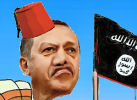 The June 7 parliamentary election in Turkey could have a huge impact on the conflict in Syria. The invincible image of President Erdogan has been cracked. There is a real chance that the election might lead to substantive change in Turkish foreign policy promoting the war in Syria. (This article first published at Dissident Voice on June 24th, 2015.)
The June 7 parliamentary election in Turkey could have a huge impact on the conflict in Syria. The invincible image of President Erdogan has been cracked. There is a real chance that the election might lead to substantive change in Turkish foreign policy promoting the war in Syria. (This article first published at Dissident Voice on June 24th, 2015.)
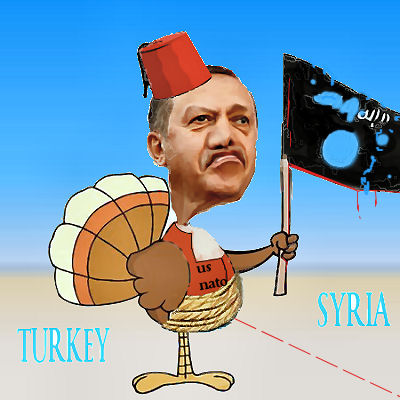
Even though Erdogan’s Justice and Development Party (AKP) won the most votes, they lost their majority in parliament and must now find a coalition partner. Turkey’s new parliament was seated for the first time on Tuesday June 23. Now begins the political bargaining and negotiations to form a governing coalition. Depending on the outcome, Turkey may stop or seriously restrict the flow of weapons and foreign fighters through its territory into Syria. If Turkey does this, it would offer a real prospect for movement toward negotiations and away from war in Syria. Why? The Syrian war continues because Saudi Arabia, Qatar, Kuwait, USA, France, UK and others are spending billions of dollars annually to fund the armed opposition and sustain the war in violation of the UN Charter and international law.
Closely allied with Qatar and the Muslim Brotherhood, Turkey has been the primary path for weapons and foreign fighters in Syria. ISIS has depended on export of oil and import of weapons and fighters through Turkey. Jabhat al Nusra, Ahrar al Sham and other armed opposition groups have depended on weapons and foreign fighters coming in via Turkey for attacks on northern Syria including Syria’s largest city, Aleppo.
Turkish Government Support of War on Syria
The following examples show the extent of Turkish involvement in the war on Syria:
Turkish Repression of Journalism, Police and Courts
The AKP government has vigorously tried to suppress information about the extent of Turkey’s support of the war on Syria. They have resorted to repression and intimidation such as:
Was American Journalist Serena Shim Murdered?
As seen in the examples above, Turkish AKP authorities have aggressively tried to suppress information on the involvement in Syria. If they have been that aggressive with Turkish journalists, prosecutors and military officers, how far might they go against a foreign journalist working for Iran’s Press TV?
The American born journalist Serena Shim died just days after she documented the use of World Food Program trucks to transport foreign fighters to the border with Syria and into ISIS territory. After learning that Turkish intelligence was looking for her, Serena Shim was so concerned that she expressed her fear on television. Two days later, Serena Shim’s car was hit head-on by a cement truck. The driver of the cement truck disappeared but was later found. There are many discrepancies about what happened. The first reports indicated the truck and driver left without stopping. Then the driver and truck were located, and then photos appeared showing a collision.
While some Turkish security services have preemptively exonerated the driver of the cement truck, the local prosecutor has filed charges against the driver, accusing him of causing death through negligence. There are many suspicious aspects, not least is the fact that the cement truck’s wheels are angled toward the car, not away as one would expect with a vehicle trying to avoid collision.
The death of American journalist Serena Shim, and her factual investigative reporting on Syria and Turkey, stands in sharp contrast with the sensational media accounts about the “kidnapping” of NBC reporter Richard Engel. That event turned out to be a hoax contrived by “rebels” to manipulate American political opinion. With the complicity of individual reporters and mainstream media, the fraud was successful. The bias in mainstream western media is further demonstrated by the almost complete media silence about the death of Serena Shim and her important journalistic work.
Turkey’s Election
For the past 13 years Erdogan’s Justice and Development Party (AKP) has had majority control of Turkey’s parliament. In the recent election AKP’s share of the popular voted plummeted 10% and they lost their parliamentary majority. The results are a clear rebuff to Erdogan and AKP policies. Sixty percent of voters went against AKP, splitting the vote among the three alternative parties. The pro-Kurdish and Leftist People’s Democratic Party (HDP) burst onto the scene capturing 13% of the votes and equaling the number of parliamentary seats captured by the rightist and anti-Kurdish National Movement Party (MHP). The main opposition party is the social democratic Republican Peoples Party (CHP) with 26% of the vote.
Over the coming weeks, AKP will try to form a coalition government with one or more of the alternate parties. However, it won’t be easy. The natural bedfellow would be the anti-Kurdish and rightist MHP, but they are demanding the resumption of a corruption trial against AKP leaders including Erdogan’s son Bilal. That trial would probably lead back to President Erdogan himself, so it seems unlikely AKP will ally with MHP. The three alternative parties could form a coalition to govern without AKP, but it’s hard to imagine the staunchly anti-Kurdish MHP allying with the pro-Kurdish HDP.
If a majority coalition cannot be formed within 45 days, the Turkish constitution requires a rerun of the election.
Election Should Bring Major Change in Syrian Policy
Even with severe repression and intimidation, the Turkish public is aware of Turkey’s policy supporting war on Syria. One consequence of the war has been almost 2 million immigrant refugees with the dispersal of many throughout Turkey, providing cheap labor and adding significantly to the unemployment problem. In addition, there have been terrorist attacks in the border region and an escalation of corruption and repression as external money and weapons have flooded the area en route to Syria. The war against Syria has been widely unpopular and played a significant role in the election.
The coming weeks will indicate how Turkey moves forward: Will AKP manage to form a coalition government with one of the opposition parties? Or will there be another election?
Will Turkey start enforcing the border and stop shipments of arms to the armed opposition as demanded by the leader of the main opposition party? This would be a huge change in the dynamics within Syria. Without a rear base of constant and steady support, the armed opposition would be forced to rely on their own resources rather than those of foreign governments. They would quickly wither since they have very little support base within Syria.
Since the election, there are already signs of a shift in the balance. Kurdish forces recently captured ISIS’ important border crossing at Tal Abyad. This has been the main route of weapons, fighters and supplies between Turkey and the Islamic State’s ‘capital’ at Raqqa in eastern Syria.
The Past Year and Looking Ahead
Thirteen months ago it looked like the war in Syria was starting to move toward resolution. The last remaining armed opposition in the “capital of the revolution” Homs, reached reconciliation and withdrew from the Old City of Homs in May 2014. On June 3, 2014 the election in Syria confirmed substantial support for the government.
Since then, we have seen dramatic changes. On June 10, 2014 ISIS surged through western Iraq and captured the city of Mosul and huge quantities of American armaments including tanks, rockets, humvees, etc. That led to the creation of the “Islamic State” and expansion in eastern Syria including Tabqa Air Base where hundreds of Syrian soldiers and ISIS fighters died.
This past spring saw the coalescing of numerous foreign and Islamist groups into the Jaish al Fatah (Army of Conquest) supported by Turkey, Saudi Arabia and Qatar. With high powered TOW anti-tank missiles and thousands of shock troops they were able to overtake both Idlib and Jisr al Shugour near the Turkish border.
ISIS and the Army of Conquest are both dependent on the Turkish supply line. If that is closed off or seriously restricted, it will dramatically change the situation.
With the prospect of losing their base of support in Turkey, will the opposition try something desperate to draw the US and NATO into the conflict directly?
The Turkish people have indicated they want to stop their government’s war on Syria. If their will is respected, it should lead to restricting and stopping the foreign funding and promotion of the conflict. If Turkey stops the flood of weapons and foreign fighters into northern Syria, it will be following instead of violating international law. This will give peace a chance in Syria.
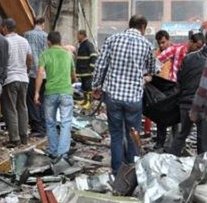
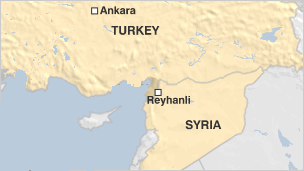
First published on PressTV, 12 May 2013 as Protesters tell Erdogan to resign. Other reporting (and misreporting) of Reyhanli terrorist bombing, and issues arising, includes: Information Minister: Turkey Bombings Terrorist Act Condemned by All Standards - SANA, Turkey blames Syria over Reyhanli bombings - Guardian, Turkey says Syrian forces behind border town bombings - Reuters, Dozens dead in Turkey car bombings - Brisbane Times, Turkey claims Assad loyalists bombed Reyhanli - , Blasts kill dozens in Turkish town Reyhanli on Syria border - BBC, Iran slams explosions in Turkish city of Reyhanli - PressTV.
Turkish protesters have called for Prime Minister Recep Tayyip Erdogan to step down following two car bombings in a town near the Syrian border.
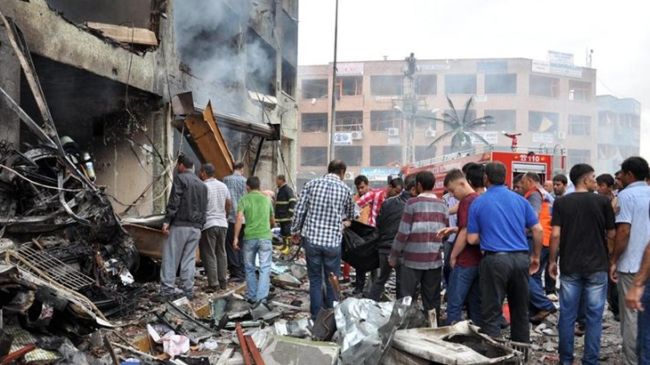
Scores of people took to the streets of the town of Reyhanli in Hatay province on Saturday after more than 40 people were killed in two car bombings that jolted the town earlier in the day.
The angry demonstrators said the outbreak of violence was due to the Erdogan administration’s anti-Syria policy.
Security was tight in the center of Reyhanli, near the scene of the blasts, with the security forces setting up checkpoints to control entry into and exit from the town, witnesses said.
A similar demonstration was briefly held in Ankara, in which dozens of people marched in the street and chanted slogans criticizing Erdogan and Foreign Minister Ahmet Davutoglu.
Turkey has been one of Syrian President Bashar al-Assad's harshest critics and has supported the foreign-backed militants fighting to topple his government.
Turkish opposition parties have censured the Turkish government for its intervention in Syria’s internal affairs.
Last July, the leader of the Republican People’s Party warned the government against dragging the country into the “Middle Eastern quagmire” with its aggressive anti-Syria stance.
The Syria crisis began in March 2011, and many people, including large numbers of soldiers and security personnel, have been killed in the violence.
The Syrian government says that the chaos is being orchestrated from outside the country, and there are reports that a very large number of the militants are foreign nationals.
Editor's comment:
As has been explained on Twitter, "The province which was attacked supports the Syrian government." This is why that town was targeted by terrorists. The Turkish government and the mainstream media have not reported that protests against the Turkish Government have been held in the Turkish town of Reyhanli in which 46 were killed in the terrorist outrage of 11 May. Instead, unfounded claims, originating from the Turkish and U.S. governments, which try to attribute blame to the Syrian Government, have been reported. An example is the report Turkey blames Syria over Reyhanli bombings of 13 may in the Guardian The Syrian Government has condemned the outrage and comprehensively refuted any suggestion that it could have been behind the outrage.
Adapted from Turkish protesters blame government for blasts from PressTV of 16 May 2013.
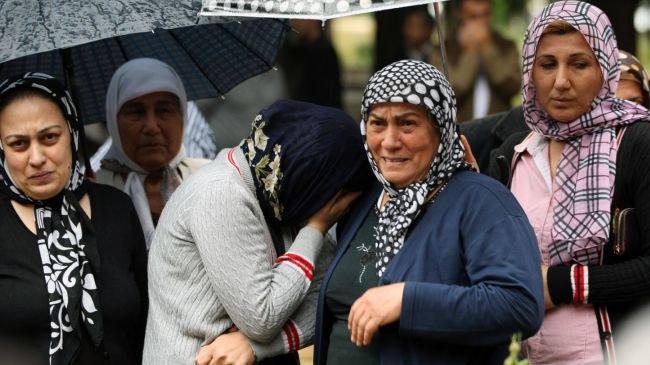
Hundreds of Turkish citizens have held demonstrations in the southern Turkish province Hatay and in the country’s largest city Istanbul to protest against Saturday’s twin car bombings, which killed 46 people and injured over a hundred others in the town of Reyhanli.
On Thursday, the protesters condemned the violence, noting that the outbreak of bloodshed was due to the Prime Minister Recep Tayyip Erdogan’s support for armed militants in Syria.
In Istanbul, the police used tear gas and water cannons to disperse the demonstrators who were marching towards the office of Erdogan.
A similar demonstration was held in Ankara on Saturday, in which dozens of people marched in the street and chanted slogans criticizing Erdogan and Foreign Minister Ahmet Davutoglu.
Turkey has accused Damascus of being behind the attack but Syria has dismissed the claim.
Syria Information Minister Omran al-Zohbi told a news conference on Sunday that his country "did not commit and would never commit such an act because our values would not allow that."
He blamed Ankara for the Saturday bombings in Reyhanli as well as the ongoing unrest in Syria by facilitating the flow of arms, explosives, vehicles, militants and money across the border into the Arab country.
"It is Erdogan who should be asked about this act... He and his party bear direct responsibility," Zohbi said.
The Syrian minister also stated that Turkey has planned the attacks to use them as a pretext to justify foreign intervention in Syria.
"Why this timing? Why these attack, just days before the meeting between Erdogan and (US President Barack) Obama? Does he (Erdogan), whose country is a NATO member, want to incite the United States (into intervening in Syria) by telling him his country has been attacked?" Zohbi said.
He added that the Turkish government has turned its border areas with Syria into centers for international terrorism.
Recent comments